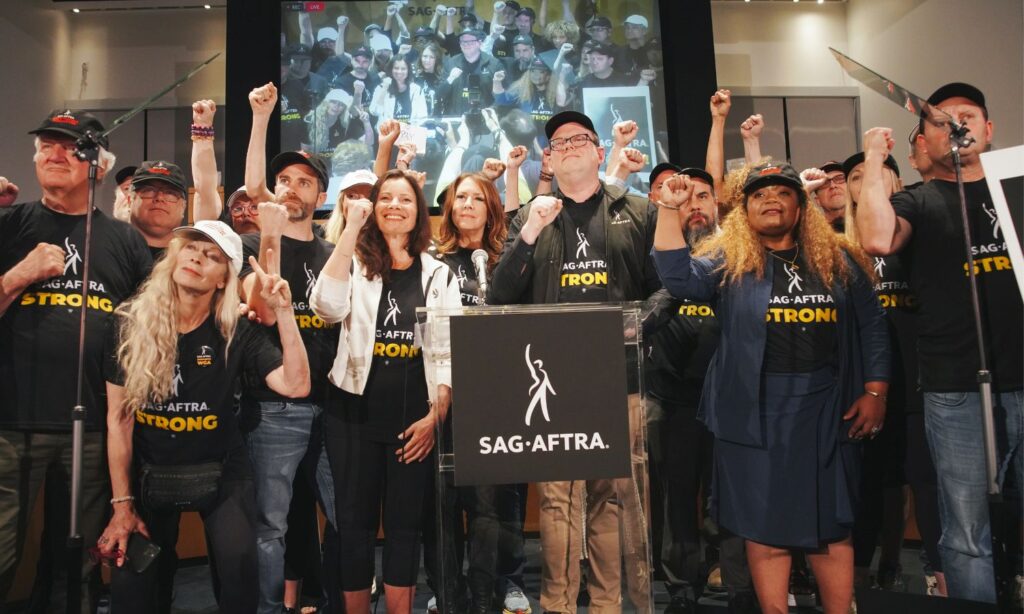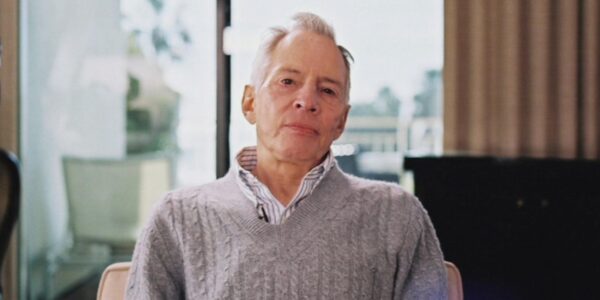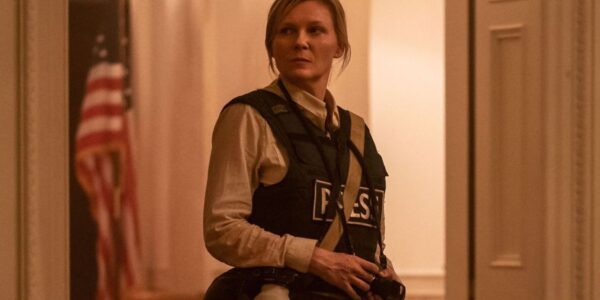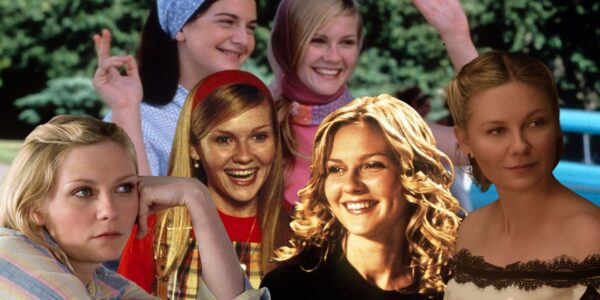The Screen Actors Guild and the American Federation of Television and Radio Artists (SAG-AFTRA) has moved to strike, marking the guild’s first strike since 1980. With the Writers Guild strike still in full force, the SAG-AFTRA strike means that the film and television industry will grind to a halt for the foreseeable future. It’s the first time that actors and writers have been on strike at the same time since 1960.
The SAG Strike has been looming over weeks of negotiations with the Alliance of Motion Picture and Television Producers (AMPTP). On June 5, SAG members held a vote, with 98% voting in favour of a strike if no deal was achieved by June 30.
The date came and went, and the deadline was extended until July 12 to allow for more negotiations. On July 13, negotiations broke off, and the Screen Actors Guild announce the strike.
The Oppenheimer Cast Leave Premiere to Join SAG Strike
Unlike the writers strike, the impact of the SAG strike can be seen instantly. Overnight, the cast of Christoper Nolan’s Oppenheimer walked out of the film’s premiere.
Christopher Nolan says the cast of #Oppenheimer left the premiere to ‘go and write their pickets’ and join the strike pic.twitter.com/rc2SaSxcfk
— Deadline Hollywood (@DEADLINE) July 13, 2023
“I have to acknowledge the work of our incredible cast, led by Cillian Murphy…” Nolan said. “The list is enormous, Robert Downey Jr., Matt Damon, Emily Blunt, Florence Pugh… and so many more.
“Unfortunately, they’re off to write their picket signs for what we believe to be imminent strike by SAG,” he continued, “joining one of my guilds, the Writers Guild, in the struggle for fair wages for working members of their union, and we are supporting them.”
The Screen Actors Guild represents more than 160,000 television and movie actors, voice artists, and other entertainment professionals. But why are actors going on strike? How will this impact the entertainment industry in the weeks and months to come? Here’s what we know.
SAG-AFTRA Moves to Strike
Speaking to the press, SAG-AFTRA President Fran Drescher and National Executive Director and chief negotiator Duncan Crabtree-Ireland announced the strike overnight.
Drescher said that the guild had “negotiated in good faith” and that they had been “eager to reach a deal that sufficiently addressed performer needs”, but the AMPTP’s response had been “insulting and disrespectful”.
Fran Drescher’s Statement
“The companies have refused to meaningfully engage on some topics and on others completely stonewalled us,” Drescher continued. “Until they do negotiate in good faith, we cannot begin to reach a deal.
“We have a problem,” she said, adding that this “is a very seminal hour” for SAG members.
“I went in thinking that we would be able to avert a strike. The gravity of this move is not lost on me,” she said. “It’s a very serious thing that impacts thousands, if not millions of people all across this country and around the world. Not only members of this union, but people who work in other industries that service the people that work in this industry.”
SAG-AFTRA President Fran Drescher on why union members will strike: 'Employers make Wall Street and greed their priority and they forget about the essential contributors that make the machine run — we have a problem' pic.twitter.com/Mb5cm3Gh8q
— NowThis (@nowthisnews) July 13, 2023
“We are being victimised by a very greedy entity. I am shocked by the way that people we have been in business with are treating us,” Drescher continued. “I cannot believe it quite frankly — how far apart we are on so many things, how they plead poverty, that they are losing money left and right when giving hundreds of millions of dollars to their CEOs. It is disgusting. Shame on them. They stand on the wrong side of history.”
“What we ultimately received from them is what my mom would call ‘a leck and a schmeck,’” she added.
Duncan Crabtree-Ireland’s Statement
Crabtree-Ireland, meanwhile, detailed the major sticking points of the negotiations.
“The studios and streamers have implemented massive unilateral changes in our industry’s business model, while at the same time insisting on keeping our contracts frozen in amber,” he said. “That’s not how you treat a valued, respected partner and essential contributor. Their refusal to meaningfully engage with our key proposals and the fundamental disrespect shown to our members is what has brought us to this point. The studios and streamers have underestimated our members’ resolve, as they are about to fully discover.”
AMPTP’s Statement
In a statement, the AMPTP responded, saying that they were “deeply disappointed that SAG-AFTRA [had] decided to walk away from negotiations”.
The statement continued: “This is the Union’s choice, not ours. In doing so, it has dismissed our offer of historic pay and residual increases, substantially higher caps on pension and health contributions, audition protections, shortened series option periods, a groundbreaking AI proposal that protects actors’ digital likenesses, and more. Rather than continuing to negotiate, SAG-AFTRA has put us on a course that will deepen the financial hardship for thousands who depend on the industry for their livelihoods.”
You can read their full statement here.
Why Are Actors Going on Strike? The SAG Strike 2023 Explained
Essentially, SAG-AFTRA has moved to strike for many of the same issues that the Writers Guild is currently on strike, with streaming residuals and regulations around the use of artificial intelligence being the focal point.
Before the strike was confirmed, Drescher and Crabtree-Ireland sent a message to the guild’s members detailing the issues.
“Over the past decade, your compensation has been severely eroded by the rise of the streaming ecosystem,” they said. “Furthermore, artificial intelligence poses an existential threat to creative professions, and all actors and performers deserve contract language that protects them from having their identity and talent exploited without consent and pay. Despite our team’s dedication to advocating on your behalf, the AMPTP has refused to acknowledge that enormous shifts in the industry and economy have had a detrimental impact on those who perform labor for the studios.”
The pair also noted that they had “engaged in negotiations in good faith and remained eager to reach a deal that sufficiently addressed performer concerns”, but that the AMPTP’s responses had “not been adequate”.
“Our 90-year history is a testament to what can be achieved through our conviction and unity,” they concluded. “For the future of our profession, we stand together.”
What Does SAG-AFTRA Want?
Back in May, Crabtree-Ireland and Drescher sent a letter to SAG members in which they flagged the possibility of a strike if the AMPTP did not agree to “essential contract improvements”. But what does that mean, and what are they fighting for?
In the letter, Crabtree-Ireland and Drescher wrote that the emergence of digital and streaming in the entertainment industry meant that actors needed “a contract that is relevant to the new business model”, one that is “contemporary to meet the financial needs of our members today”.
The new contract, they wrote, would protect actors from “erosion of income due to inflation and reduced residuals, unregulated use of generative AI, and demanding self-taped auditions”.
More specifically, when it comes to the use of artificial intelligence in film and television, SAG-AFTRA wants to “protect the digital likeness, voice, and performance simulations of its members”. Essentially, they’re trying to protect SAG members from having the Joan Is Awful episode of Black Mirror become a reality.
The other main issue is streaming residuals. Unlike syndicated network shows like Friends or The Big Bang Theory, where the cast receive money from reruns, streaming contracts don’t offer residuals, no matter how popular a show is.
What Does the Strike Prevent Actors From Doing?
In short? It prevents them from working. Until a new contract has been negotiated, Hollywood is on pause. No SAG-AFTRA member can work on any scripted film or television project until the new contract has been negotiated.
It’s not just filming projects, though. The actors also can’t promote any work that has already been completed, do any pre-production work like auditions, costume fittings or hair and makeup tests, and much, much more.
As we’ve already seen with Oppenheimer, film premieres will be shut down, but with the Emmy Awards just around the corner, and the major film festivals on the horizon, we can expect things to look very different in the coming months. When it comes to public appearances, actors will be limited to charities, music ventures, fashion and beauty partnerships, rather than red carpets and press circuits.
For the full list of SAG Strike rules, you can read their official bulletin here.
Are There Any Actors Who Aren’t Impacted?
Yes. Most theatre workers aren’t affected, as they’re represented by the Actors’ Equity Association, rather than SAG-AFTRA.
Meanwhile, there are a number of people who are represented by SAG who aren’t affected. This is news anchors, soap actors, talk show hosts, and game show hosts. They’re represented under a different contract, which will be up for re-negotiation next year.
Why House of the Dragon Is Still in Production
House of the Dragon Season 2 is currently in production, and won’t be shutting down over the strike. That’s because despite being a HBO production, its stars work under British Equity contracts, rather than SAG-AFTRA contracts.
British Equity has released a statement in which they said they stand “in unwavering solidarity with SAG-AFTRA and its members”.
They continued: “Equity U.K. will support SAG-AFTRA and its members by all lawful means. Because of existing anti-trade union laws in the U.K., SAG-AFTRA members currently working under an Equity U.K. collective bargaining agreement should continue to report to work. Equity U.K. will support SAG-AFTRA’s refusal to issue new Global Rule One addenda that undermine the strike during the pendency of the strike. Standing together, we will work to achieve the wages and working conditions that all performers deserve.”
Indie Productions Are Being Granted Waivers
A new report from Deadline states that SAG-AFTRA has been working on granting waivers for independent projects that will allow them to work through the strike.
“We put the application process up on the first day of the strike,” said SAG-AFTRA chief negotiator Duncan Crabtree-Ireland. “And we’ve already got hundreds of applications … we will be responding to all of them”.
In order to be approved for a waiver the project cannot have “any AMPTP fingerprints” on it.
“We will give as many interim agreements as we can, so long as they are truly independent,” Crabtree-Ireland said. “Our staff has to read each and every one to make sure that they are truly independent … we’re working through that as fast as we can.”
Influencers and the SAG-AFTRA Strike
SAG-AFTRA has released a set of influencer-specific rules for the strike. These rules cover brand deals and events like Comic-Con.
Under these rules, influencers are still permitted to pursue commercial work and brand deals. In this sense, it’s the same deal for actors — they can’t work on any acting projects, but they can still do commercials, charity work, or pursue their dreams of becoming a musician.
However, influencers — whether they’re SAG-AFTRA members or not — are forbidden from promoting any content produced by a struck company, even if they’re not being paid to do so. Essentially, if Paris Hilton goes to see Barbie this weekend and posts on her Instagram story about how much she loved it? That’s a violation of the strike.
If an influencer had already signed a contract to promote a struck work before the strike was announced, that’s fine. They’re allowed, and expected, to fulfil the obligations of their contract. They should refrain from signing any new contracts while the strike is on, though.
As for Comic-Con, SAG-AFTRA states that influencers “cannot participate in conventions such as Comic-Con on behalf of, or to promote, companies we are striking against”.
This means no “appearances, panels, fan meet and greets, etc. involving struck work”.
If the influencer is participating in the convention in a way that is “wholly independent of characters from struck work or sponsorship by struck companies”, that’s permitted. Basically what this means is no influencer work, and no attending in cos-play.
Any influencer who is not a member of SAG-AFTRA who breaks any of these rules will be ineligible to join the union in the future.
Are Journalists Considered Influencers?
In the wake of the influencer rules, there’s been a lot of conversation online around film critics and entertainment journalists who are covering struck work during the SAG-AFTRA strike.
Journalists are not considered influencers, and SAG-AFTRA has stated that they “are not telling journalists they cannot do their jobs”.
Also just sharing the response that I got from them when I reached out.
“We are not telling journalist they cannot do their jobs. You will not [be] barred membership for doing so.” https://t.co/Wi5Oiv7qDh pic.twitter.com/vF1A74XvYI
— Tamara Fuentes (@tamara_fuentes) July 16, 2023
Should People Be Boycotting Struck Work in Solidarity?
Thinking about seeing Barbie or Oppenheimer this weekend, but want to support the SAG-AFTRA strike? Don’t worry!
Neither SAG-AFTRA nor the Writers Guild have called for a consumer boycott of struck work.
Neither the WGA or SAG-AFTRA is calling for a consumer boycott right now. If you want to support the strike, we're asking folks to:
1) Boost our message on social media
2) Donate to the Entertainment Community Fund, which supports affected workers https://t.co/HmUJCZaH2r https://t.co/QFz9aZ7KqS— Adam Conover (@adamconover) July 15, 2023
What Happens Next?
Not much! It’s now a waiting game. If the writers strike is anything to go by, we probably shouldn’t hold our breath for a quick resolution.
Earlier this week, Deadline reported that the studios are expecting the strike to go on for months. In fact, they’re not just expecting it — they’re planning on letting writers “bleed out” before they’ll renegotiate.
“The endgame is to allow things to drag on until union members start losing their apartments and losing their houses,” one industry executive said.
Want more entertainment news? Click here to read all our content, and check out the stories below:
- Real or Fake? The Question at the Centre of Jury Duty
- ‘Fast X’ Is the Perfect Reminder That It’s Time for a Best Stunts Oscar
- The 2007 Writers Strike Changed Everything. Will the 2023 One Do the Same?
- “An Extraordinary Blessing”: Greta Gerwig on the ‘Barbie’ Movie Hype
- James Marsden Is Up For a ‘Jury Duty’ Emmy — Here’s Why He Deserves It
- How Hayley Atwell Developed Her ‘Mission: Impossible’ Character As They Went
- Will Christopher Nolan Hit Another Home Run? What We Know About ‘Oppenheimer’
- Yes Chef! ‘The Bear’ Season 2 Has An Official Release Date and Trailer
- Can’t Get Enough Tassie-Set Crime Comedies? ‘Bay of Fires’ Is Coming
- ‘Mission: Impossible’: Simon Pegg and Pom Klementieff on What Sets ‘Dead Reckoning’ Apart
- Anna Konkle on Her “Strange, Stilted, Alien” Character in ‘The Afterparty’ Season 2
Read more stories from The Latch and subscribe to our email newsletter







